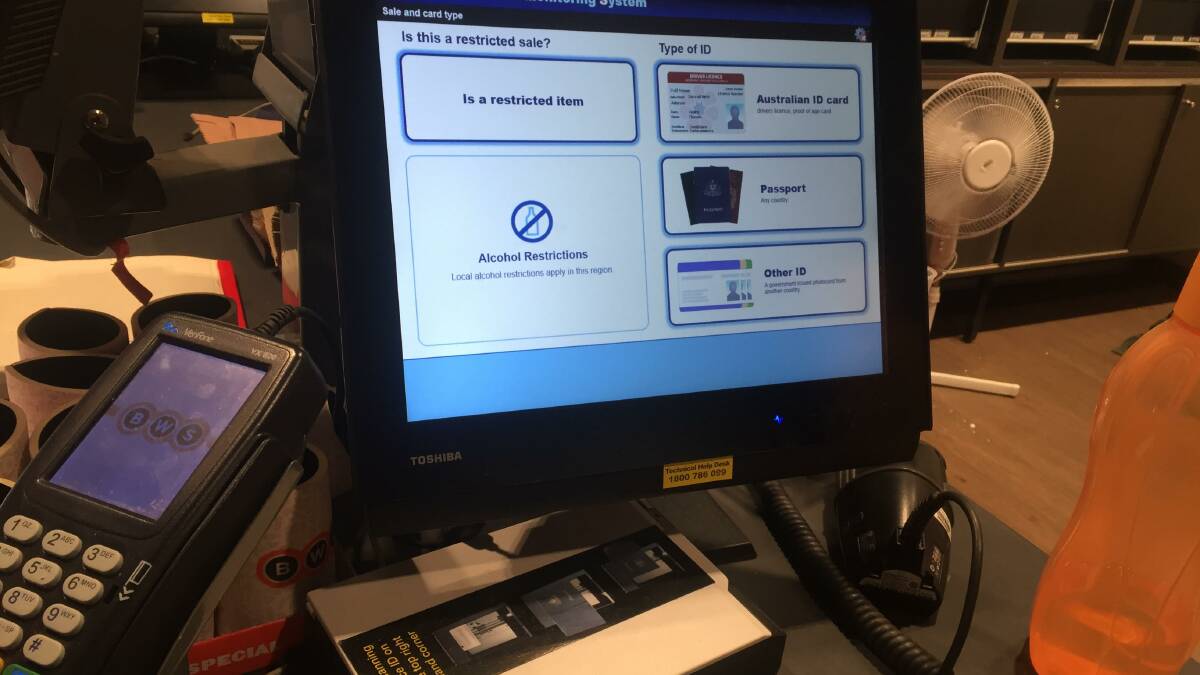
Scanning your driver’s licence or ID each time you buy alcohol is paying dividends in Katherine.
Subscribe now for unlimited access.
or signup to continue reading
The biggest percentage of adults arrested for an alcohol-related offence were found to be on the Banned Drinkers Register in Katherine.
Across the NT, 33 per cent of adults arrested during the first year of the BDR were listed on the register but in Katherine the figure was a Territory high 44 per cent.
Tennant Creek came second with 42 per cent.
The NT Government has just released the first part of a report on the first 12 months of the heavily criticised BDR.
The independent evaluation overseen by Menzies School of Health Research points to a reduction in the supply of alcohol to problem drinkers and reductions for individuals whose alcohol related behaviour was causing repeat offending.
It is less clear whether the BDR has led to a reduction in crime.
Many people, Katherine’s Mayor Fay Miller among them, criticised the reliance on the BDR over police at bottle shops as the chief method of reducing public drunkenness.
Police have since returned full time to bottle shop duties with liquor inspectors – 22 for Katherine – set to replace them.
Since the BDR was rolled out in September 2017, around 7400 people have been placed on the BDR and there have been more than 9000 refusals of sale.
As at August 31, there were 3682 adults on the BDR.
The report shows the total number of alcohol-attributable presentations to Katherine Hospital’s emergency department rose 22 per cent over the past year.
The 12 month evaluation has indicated that the following benefits are being seen since the reintroduction of the BDR:
Alcohol treatment episodes have increased from a monthly average of 221 to 259 since the BDR commenced, showing that more people are voluntarily seeking treatment to address their problem drinking.
People who have a high number of alcohol related incidents in the justice system have shown a reduction since being on the BDR.
More people are self-referring onto the BDR compared to the previous model.
Sobering Up Shelter admissions have generally increased in most centres over the first year of the BDR. As a harm reduction measure, the SUS is often the entry point for people to commence treatment.
The Banned Drinker Register is one part of a suite of comprehensive measures to tackle alcohol-related crime and anti-social behaviour. This includes giving police the power to shut down bottle shops caught irresponsibly selling alcohol, stationed Auxiliary cops on bottle shops and banned additional takeaway Liquor Licenses.
The review also said it would be important to understand the impacts and outcomes of the BDR in relation to the new liquor inspectors and the minimum unit price on alcohol.
The Government says it will continue to independently evaluate the BDR and identify ways to further enhance and improve its effects for the community with the next evaluation releasing in June 2019.
Health Minister Natasha Fyles said: “Territorians have had a gutful of crime and anti-social behaviour on our streets.
“Our alcohol reforms are about cutting crime. We are targeting alcohol abuse to make our communities safer.
“We have taken clear steps to build on the BDR with a suite of evidence based reforms for alcohol harm reduction, based on the Alcohol Policy and Legislation Review (Riley Review).”
Professor Peter Miller, Director of the Centre for Drug Use, Addictive and Anti-social Behaviour Research, Deakin University said the NT has the highest per capita consumption of alcohol in Australia.
Alcohol-attributable deaths occur in the NT at about 3.5 times the rate they do in Australia generally.
“In this context, strong measures are clearly justified and the NT Government’s focus on alcohol will provide important lessons for the NT and other governments nationally and internationally,” he said.
The NT Government has also released the independent review on the Sobering Up Shelters across the Territory.
The shelters are operational in five spots – Katherine, Alice Springs, Tennant Creek, Darwin and Nhulunbuy.
The report includes 10 recommendations to further develop the Sobering Up Shelters services. Government has accepted the recommendations and work is already underway to address them.
The review highlighted the following:
- The importance of the Shelters as an entry point into an overall alcohol and other drugs treatment system,
- The importance of partnerships with other frontline services,
- The need for training opportunities for staff to assist in intervention,
- Cohesion of information recording to better target service responses and,
- The role the Shelters can provide in linking patients with other health and community services.
While you're with us, you can now receive updates straight to your inbox each Friday at 6am from the Katherine Times. To make sure you're up to date with all the news, sign up here.

